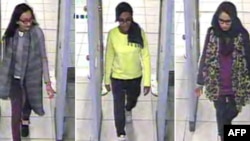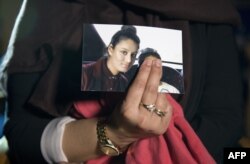The British government’s effort to revoke the citizenship of a British-born Islamic State bride, currently held in a refugee camp in northeast Syria, risks being overturned on appeal, say some legal experts.
A former top British prosecutor, Nazir Afzal, told VOA he thinks it “likely that this decision will be held to be unlawful.”
He says 19-year-old Shamima Begum should be repatriated and placed in a de-radicalization program. “We have excellent experience of de-radicalizing people and often they go on to work in preventing others from being radicalized armed with the unique knowledge of the journey of a radicalized person. This ultimately protects our fellow citizens,” he says.
Begum, who’s in a Kurdish-managed refugee camp in northeast Syria, joined the militant group in 2015 at the age of 15, running off with two school friends, all from east London. One of the girls died in an airstrike in 2016; the other, Amira Abase, is still in IS territory. At least 900 Britons, an estimated 145 of them women and 50 minors, joined IS.
What to do with them?
More than 900 foreign jihadists and 3,200 wives and children are being held by the Kurds, including U.S.-born Hoda Muthana, who’s being barred from returning to the United States on the grounds that she has no right to American citizenship.
According to the State Department, her Yemeni father held diplomatic status at the time of her birth, a claim denied by the girl’s family.
The question of what to do with surviving foreign IS recruits — especially IS brides, many of whom were teenagers when recruited — is fast becoming a major international crisis and prompting diplomatic rifts amid rising concerns that they represent a collective security risk if left in Syria, but also individual security threats, if returned to their home countries.
The Kurds have warned that they can’t keep the recruits much longer.
That is also the position of the Trump administration, which, for more than a year, has urged European governments to take back surviving recruits — and prosecute them. Otherwise, they will slip away, they say, from refugee and detention facilities in northeast Syria and pose a greater threat once unsupervised. Last Saturday, President Donald Trump urged the Europeans to take charge of their rogue citizens, saying the alternative is the Kurds will have to free them.
Viewed as threat
The Europeans, though, see the surviving fighters and their wives as a grim threat, the deadly legacy of a murderous movement that has been defeated on the battlefield. Western intelligence officials say they are already overstretched trying to monitor tens of thousands of suspected extremists who never left their home countries. And European governments say mounting prosecutions will be difficult as they won’t be able to gather sufficient evidence for convictions.
Opinion polls in Britain show the overwhelming majority does not want the IS survivors to be re-admitted. Amid a mounting public outcry about the possibility of Begum returning to Britain, British Interior Minister Sajid Javid Wednesday announced he was revoking her citizenship, saying that as her parents had been born in Bangladesh she is a dual national and therefore can apply for a Bangladeshi passport. Under international law, it is illegal for a country to make someone stateless by removing his or her citizenship.
The Bangladeshi government, though, has now also declared that Begum, who gave birth Sunday to a boy, is not a Bangladeshi citizen, saying she is British by birth and has never applied for dual nationality with Bangladesh. The country's foreign minister, Shahriar Alam, says there is no question of her being allowed to enter Bangladesh.
Afzal says the British government failed to do due diligence before revoking Begum’s citizenship and that the revocation will likely be overturned, if her family appeals the decision, as they have indicated they will. Her family says she was groomed by IS recruiters. “The Bangladesh government has already confirmed that she is not one of theirs and a simple phone call before this decision was made would have shown that. It therefore seems likely that this decision will be held to be unlawful,” he says.
Redemption possible?
Afzal, a former CEO of the Association of Police and Crime Commissioners, gained national attention in Britain for pioneering difficult prosecutions to tackle honor-based violence and forced marriage, as well as child sexual exploitation and grooming by Muslim-based gangs in the northwest of England.
“She is British, born here, schooled here, radicalized here and therefore she is our problem,” he says. He argues she should be prosecuted for membership of “a proscribed terror organization and there may be other crimes after investigating and she should face justice here.”
But longer-term, Afzal places faith in the effectiveness of de-radicalization programs. He compares the IS recruitment of youngsters with sexual grooming. “I have long said that the process of grooming for extremism is the same as that for sexual exploitation and also organized crime. The manipulation of vulnerable people is at its heart.”
There is fierce debate over the effectiveness of de-radicalization programs, which aim to change a person's ideas and attitudes by not only tackling ideology but confronting personal issues which may have been at the root of the drive toward radicalization. And the picture is mixed across Europe with some rehabilitation methods being more successful than others.
Experts acknowledge that de-radicalization is not an exact science and techniques that work with one person fail with another. Each de-radicalization candidate has to be approached differently and the exercise has to be prolonged and is expensive both in terms of time and money, they say.
And even then success in not guaranteed. Ahmed Hassan, the Parsons Green tube bomber, who detonated a bomb on a train in London in 2017, injuring 51 people, had been enrolled in a de-radicalization program for months.
But there have also been plenty of documented successes, including Hanif Qadir, who was radicalized in 2002 and joined al-Qaida in Afghanistan before breaking with the militants when he recoiled at the use of children as suicide bombers. Now active in de-radicalization, he told the BBC he thought Begum would be a good candidate for rehabilitation.
That view is shared by the The Times reporter Anthony Loyd, who first interviewed the 19-year-old. Her inflammatory remarks to him and subsequent media interviewers, including expressing no remorse for joining IS and defending the beheadings carried out by the militants, prompted public outrage.
But writing in The Times Thursday, Loyd noted that in private conversation with him away from other IS members, she expressed deep anger about the group’s cruelty. Loyd wrote that he thought “within the mental confines placed upon her by the so-called caliphate there lurks an independently-minded young woman who, with the right help, may be able to emerge from her radicalized state.”















